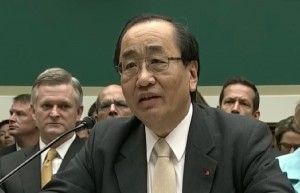
Takata's Hiroshi Shimizu testified that a national recall wasn't necessary during a congressional subcommittee hearing.
This story has been updated to include Takata’s response to the announcement.
After months of denials and delays, Takata acknowledged defects in more than 16 million driver-side and 17 million passenger-side airbag inflators in the U.S. As a result, the National Highway Traffic Safety Administration (NHTSA) issued a consent order to the supplier, requiring Takata to comply with all requests from the safety agency, including a recall of all affected vehicles.
“From the very beginning, our goal has been simple: a safe air bag in every vehicle,” said NHTSA Administrator Mark Rosekind in a statement.
“The steps we’re taking today represent significant progress toward that goal. We all know that there is more work to do, for NHTSA, for the auto makers, for parts suppliers, and for consumers. But we are determined to get to our goal as rapidly as possible.”
Takata’s Chairman & CEO Shigehisa Takada was conciliatory.
“We are pleased to have reached this agreement with NHTSA, which presents a clear path forward to advancing safety and restoring the trust of automakers and the driving public,” he said in a statement.
“We have worked extensively with NHTSA and our automaker customers over the past year to collect and analyze a multitude of testing data in an effort to support actions that work for all parties and, most importantly, advance driver safety.”
The company also noted that its ongoing investigation of the problem with the inflators, conducted in concert with Fraunhofer ICT, show that it couldn’t have known this would occur.
“The analysis to date suggests that the potential for this long-term phenomenon to occur was not within the scope of the testing specifications prescribed by the vehicle manufacturers for the validation and production of the subject inflators as original equipment,” the company said.
The affected vehicles will be recalled with vehicles in areas with high humidity being the considered the vehicles with the highest priority. Ultimately, it will be the largest single recall in U.S. history, surpassing the recall of 31 million Tylenol bottles in 1982.
“Today is a major step forward for public safety,” Secretary Foxx said. “The Department of Transportation is taking the proactive steps necessary to ensure that defective inflators are replaced with safe ones as quickly as possible, and that the highest risks are addressed first. We will not stop our work until every air bag is replaced,” Transportation Secretary Anthony Foxx said in a statement.
The move comes after months of the Japanese auto supplier steadfastly denying assertions the airbag inflators were defective, causing them to explode in some cases sending shrapnel into the cabin of the vehicle. The faulty inflators are alleged to have caused at least six deaths and dozens of injuries.
(Another 5 Mil Vehicles Added to Takata Airbag Recall. For more, Click Here.)
Several automakers issued recalls on the vehicles in spite of Takata’s stance regarding the airbags. In the U.S., 17 million vehicles have been subject to actions from Honda, Toyota and other makers.
(Click Here for details about Toyota, Nissan Recalling Another 6.5 Mil Vehicles For Faulty Airbags.)
Takata has been unable to keep up with the demand for replacement airbag kits for the affected vehicles despite expanding production capacity. The company’s competitors have been enlisted to help with the backlog, but even with the additional help, it has been estimated it would take more than two years to get the repairs completed.
(To see more about Honda, Toyota having the best relationships with suppliers, Click Here.)
That doesn’t account for the potential doubling of that number of affected vehicles in the U.S. Globally the number of vehicles recalled is at 35 million.

what about the Canadian side. and please show the whole list that need to be replaced. Thank You. Frank.